Barış Büyüktaş
FedX: Explanation-Guided Pruning for Communication-Efficient Federated Learning in Remote Sensing
Aug 08, 2025Abstract:Federated learning (FL) enables the collaborative training of deep neural networks across decentralized data archives (i.e., clients), where each client stores data locally and only shares model updates with a central server. This makes FL a suitable learning paradigm for remote sensing (RS) image classification tasks, where data centralization may be restricted due to legal and privacy constraints. However, a key challenge in applying FL to RS tasks is the communication overhead caused by the frequent exchange of large model updates between clients and the central server. To address this issue, in this paper we propose a novel strategy (denoted as FedX) that uses explanation-guided pruning to reduce communication overhead by minimizing the size of the transmitted models without compromising performance. FedX leverages backpropagation-based explanation methods to estimate the task-specific importance of model components and prunes the least relevant ones at the central server. The resulting sparse global model is then sent to clients, substantially reducing communication overhead. We evaluate FedX on multi-label scene classification using the BigEarthNet-S2 dataset and single-label scene classification using the EuroSAT dataset. Experimental results show the success of FedX in significantly reducing the number of shared model parameters while enhancing the generalization capability of the global model, compared to both unpruned model and state-of-the-art pruning methods. The code of FedX will be available at https://git.tu-berlin.de/rsim/FedX.
A Multi-Modal Federated Learning Framework for Remote Sensing Image Classification
Mar 13, 2025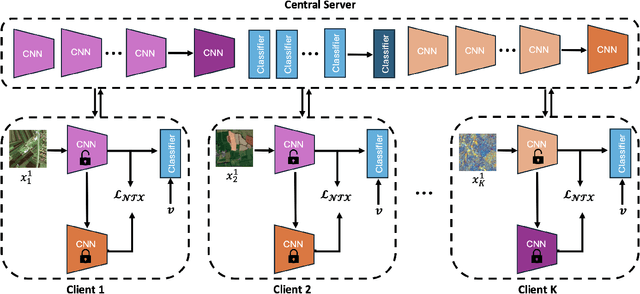
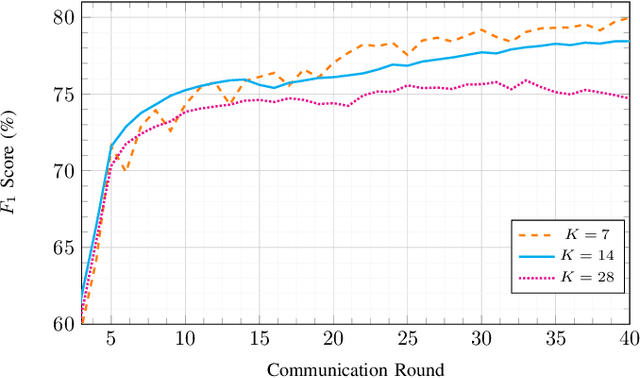
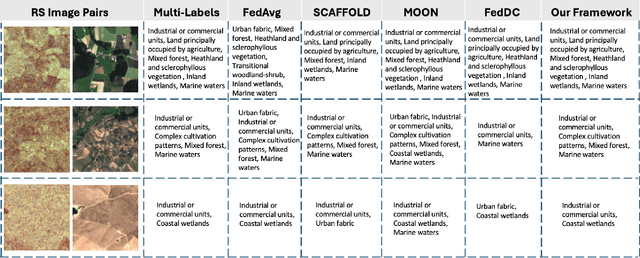

Abstract:Federated learning (FL) enables the collaborative training of deep neural networks across decentralized data archives (i.e., clients) without sharing the local data of the clients. Most of the existing FL methods assume that the data distributed across all clients is associated with the same data modality. However, remote sensing (RS) images present in different clients can be associated with diverse data modalities. The joint use of the multi-modal RS data can significantly enhance classification performance. To effectively exploit decentralized and unshared multi-modal RS data, our paper introduces a novel multi-modal FL framework for RS image classification problems. The proposed framework comprises three modules: 1) multi-modal fusion (MF); 2) feature whitening (FW); and 3) mutual information maximization (MIM). The MF module employs iterative model averaging to facilitate learning without accessing multi-modal training data on clients. The FW module aims to address the limitations of training data heterogeneity by aligning data distributions across clients. The MIM module aims to model mutual information by maximizing the similarity between images from different modalities. For the experimental analyses, we focus our attention on multi-label classification and pixel-based classification tasks in RS. The results obtained using two benchmark archives show the effectiveness of the proposed framework when compared to state-of-the-art algorithms in the literature. The code of the proposed framework will be available at https://git.tu-berlin.de/rsim/multi-modal-FL.
Transformer-based Federated Learning for Multi-Label Remote Sensing Image Classification
May 24, 2024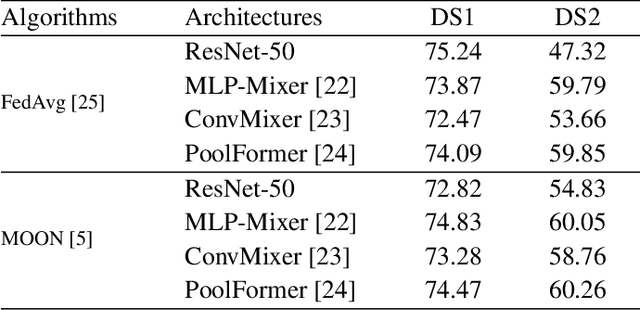
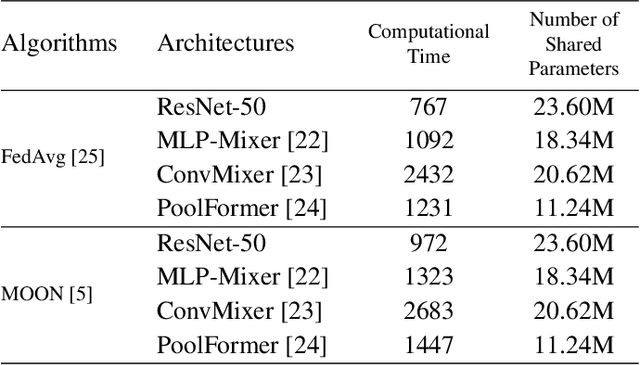
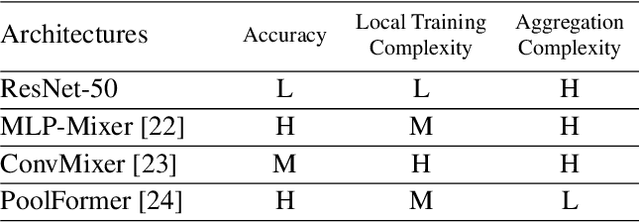
Abstract:Federated learning (FL) aims to collaboratively learn deep learning model parameters from decentralized data archives (i.e., clients) without accessing training data on clients. However, the training data across clients might be not independent and identically distributed (non-IID), which may result in difficulty in achieving optimal model convergence. In this work, we investigate the capability of state-of-the-art transformer architectures (which are MLP-Mixer, ConvMixer, PoolFormer) to address the challenges related to non-IID training data across various clients in the context of FL for multi-label classification (MLC) problems in remote sensing (RS). The considered transformer architectures are compared among themselves and with the ResNet-50 architecture in terms of their: 1) robustness to training data heterogeneity; 2) local training complexity; and 3) aggregation complexity under different non-IID levels. The experimental results obtained on the BigEarthNet-S2 benchmark archive demonstrate that the considered architectures increase the generalization ability with the cost of higher local training and aggregation complexities. On the basis of our analysis, some guidelines are derived for a proper selection of transformer architecture in the context of FL for RS MLC. The code of this work is publicly available at https://git.tu-berlin.de/rsim/FL-Transformer.
Federated Learning Across Decentralized and Unshared Archives for Remote Sensing Image Classification
Nov 10, 2023Abstract:Federated learning (FL) enables the collaboration of multiple deep learning models to learn from decentralized data archives (i.e., clients) without accessing data on clients. Although FL offers ample opportunities in knowledge discovery from distributed image archives, it is seldom considered in remote sensing (RS). In this paper, as a first time in RS, we present a comparative study of state-of-the-art FL algorithms. To this end, we initially provide a systematic review of the FL algorithms presented in the computer vision community for image classification problems, and select several state-of-the-art FL algorithms based on their effectiveness with respect to training data heterogeneity across clients (known as non-IID data). After presenting an extensive overview of the selected algorithms, a theoretical comparison of the algorithms is conducted based on their: 1) local training complexity; 2) aggregation complexity; 3) learning efficiency; 4) communication cost; and 5) scalability in terms of number of clients. As the classification task, we consider multi-label classification (MLC) problem since RS images typically consist of multiple classes, and thus can simultaneously be associated with multi-labels. After the theoretical comparison, experimental analyses are presented to compare them under different decentralization scenarios in terms of MLC performance. Based on our comprehensive analyses, we finally derive a guideline for selecting suitable FL algorithms in RS. The code of this work will be publicly available at https://git.tu-berlin.de/rsim/FL-RS.
Learning Across Decentralized Multi-Modal Remote Sensing Archives with Federated Learning
Jun 01, 2023



Abstract:The development of federated learning (FL) methods, which aim to learn from distributed databases (i.e., clients) without accessing data on clients, has recently attracted great attention. Most of these methods assume that the clients are associated with the same data modality. However, remote sensing (RS) images in different clients can be associated with different data modalities that can improve the classification performance when jointly used. To address this problem, in this paper we introduce a novel multi-modal FL framework that aims to learn from decentralized multi-modal RS image archives for RS image classification problems. The proposed framework is made up of three modules: 1) multi-modal fusion (MF); 2) feature whitening (FW); and 3) mutual information maximization (MIM). The MF module performs iterative model averaging to learn without accessing data on clients in the case that clients are associated with different data modalities. The FW module aligns the representations learned among the different clients. The MIM module maximizes the similarity of images from different modalities. Experimental results show the effectiveness of the proposed framework compared to iterative model averaging, which is a widely used algorithm in FL. The code of the proposed framework is publicly available at https://git.tu-berlin.de/rsim/MM-FL.
 Add to Chrome
Add to Chrome Add to Firefox
Add to Firefox Add to Edge
Add to Edge